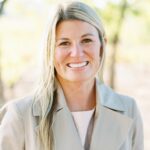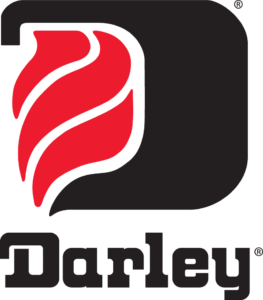
Audrey Darley Welch heads up the partner program for Darley Defense, W.S. Darley & Company’s military distribution business and its largest division. Her team manages the company’s partnerships with key suppliers of tactical and fire-fighting products and services. In this episode, Audrey shares lessons she learned from working in various industries and now at Darley. She tells how she adapts to working in a male-oriented field, how she applies sports metaphors to her team, and what she learned from bad assumptions.
Key Takeaways
[2:09] Audrey originally had intended to become a high school math teacher and volleyball coach. But she didn’t realize you had to be a calculus whiz to teach algebra! She decided to go into finance, instead. She is still passionate about sports and coaching.
[3:01] Darley, a family-owned business of four generations, has a family employment policy that requires family members to work outside the business for a period before joining Darley. Audrey had not planned to work at Darley. She started a banking career after college. After three years, she considered joining Darley. For a year she went to board meetings and shareholder meetings and researched Darley.
[3:53] When Audrey decided she wanted to join Darley, she wrote an application essay. The open position was a dealer development person for Darley’s legacy pump division. She got the job and spent a year working in that area but it was not the ideal position for her background in finance and relationship management.
[4:28] Audrey was interested in getting exposure to different areas of the business. She found a position in supplier relationship management in the Defense Division. It was a job she was weel-qualified for and she has been working in the supplier relationship function for the last seven years.
[5:40] Working at a large bank before coming to Darley allowed Audrey to see how big companies do things, their policies, and their structure. She was able to see what her strengths were at work. The largest thing she learned was the discipline and accountability of being part of a professional organization.
[7:03] Audrey feared before joining Darley that she would have to follow her father’s leadership style. He is an extrovert and Audrey is introverted. Audrey’s advice to the next generation would be to be natural. She also advises the next generation to find out what fresh ideas the business needs to set it up for success, respecting the secret sauce, the family. Darley has had 300% growth in the last five years.
[10:01] Audrey doesn’t have a problem with being an offspring, the fourth generation, or being a woman in a male-dominated field. She works well with her male cousins and men in the industry. She goes on pheasant hunts, fishing, and to the Wisconsin supper clubs with the men, so being a woman didn’t make a difference to her career. Audrey describes a Wisconsin supper club, for those unfamiliar.
[12:34] Audrey talks about one’s personal responsibility to pursue professional development. Especially in the family business environment, it’s all about initiative. She doesn’t expect her generation to be nurtured in the business. Each person needs to pave their own way. Audrey recommends a career map with a “From-To” statement and figuring out what kind of experiences you need to get there.
[15:26] Does Audrey want to be President? At Darley, there is no job description for President; currently, the CEO, President, and Chairman are all the same person. So Audrey went ahead and developed a job description for the President as she sees it and as she thinks she would do well in that role, and where they can split off CEO responsibilities. She finds those types of exercises to be very refreshing.
[17:25] Soon, the fourth generation will get together to talk about all the positions and get clarity on succession planning. Everybody at Darley has worn a lot of different hats, and it’s time to separate their roles, especially of the senior leadership team.
[18:51] In a mid-level role like Audrey’s, leadership is tough. She has five direct reports and will soon have six. The company is trying to scale, with top-level goals, and every team is checking that their goals align with the company goals, but managers may not realize they do not align with cross-functional team goals. Audrey shares a misstep she had made with goals that impacted the Sales Team’s goals.
[22:11] Audrey presented to senior management in a virtual meeting the initiative she had developed. When she heard “crickets,” she knew something was wrong. She started getting pushback from sales and business development. Her incorrect assumptions had damaged her trust level across departments. Sales reps started having friction with account managers. Get feedback! Silence is not compliance!
[24:46] Audrey ties a lot of her leadership to sports and the volleyball she played in school. She was the setter in volleyball, setting her teammates up for success. The setter is usually named the captain of the team because they’re running the plays. At work, she considers herself the captain of her team, and the coach. Audrey is concerned about perfecting the fundamentals.
[25:46] Audrey’s volleyball coach had her do 1,000 repetitions against the wall before coming out for a game to start setting people up in the warm-up. She uses repetition at Darley, focusing on strategies and core competencies.
[27:30] Sports metaphors may not work for everybody. Audrey says something that applies to almost all sports is never to sacrifice form for speed. That’s how you get injured. Slow down to speed up.
[28:45] Government contract bids need to be submitted within 72 hours. Audrey says that cutting corners on supplier due diligence can cause problems. Darley’s core value is integrity, and speed is not integrity. Never bypass your core values.
[31:54] Audrey tells how she achieves work-life balance. She has her priorities straight. Even so, when she chooses personal over business or business over personal, sometimes there is some guilt felt. Her husband helps. Figure out work patterns with your partner or whoever is helping you with all this and get into a routine.
[34:38] Audrey does not think remote work will go away. Audrey prefers hybrid to all-remote. About 60% of companies are offering remote work. It’s not a fad. Audrey values in-person collaboration.
She values in-person collaboration time in the office. That can be managed in two-to-three days. Remote doesn’t work for every position. Audrey’s quality of life has drastically improved through hybrid work.
[37:08] Audrey comments on what veterans can do to have a successful transition to business life. Veterans at Darley are very aligned with and connected to the mission, which catapults their careers forward. The biggest challenge is understanding the business world. You need to be flexible and wear different hats. You may be uncomfortable. Getting an MBA before coming to Darley helps a lot.
[40:21] Three points that will help anyone transitioning into the business world: 1. Be curious, 2. Be adaptable, and 3. Figure out ways to be confident without knowing everything about everything.
[41:04] Audrey’s closing thought for listeners: Build your sounding board early. Besides joining forums, having mentors, and tapping the knowledge of the board of directors, it is most important to participate in a peer group to help you get where you want to go.
[42:37] Closing quote: Remember, “There is only one corner of the universe you can be certain of improving, and that is your own self.” —Aldous Huxley
The Leadership Podcast is sponsored by W.S. Darley & Company.
Founded in 1908, Darley remains a family owned and operated business, providing the highest quality equipment solutions to our country’s warfighters and firefighters.
Learn more at darley.com and darleydefense.com


Recent Comments